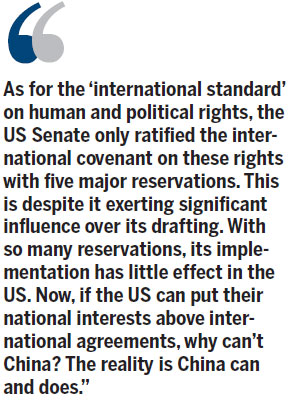China critics don't understand 'One Country, Two Systems'
Updated: 2014-04-17 05:41
By Yan Ming(HK Edition)
|
|||||||
There has been a wave of complaints in the Western press lately about the Chinese central government "backtracking" over implementing the "One Country, Two Systems" principle in Hong Kong. This criticism also came from a few prominent political figures in Hong Kong. It is rather odd that none offered any hard evidence to back their accusations, considering some are lawyers who presumably know how to present flawless arguments.
While trying to make sense of these accusations I noticed their ignorance on what exactly the "One Country, Two Systems" principle refers to. In the Basic Law, "Two Systems" refers to two social systems - socialist and capitalist - existing in one country. Those complaining about the implementation of the "One Country, Two Systems" principle are thinking of something else - what they often call "democracy".
Perhaps, regarding capitalism and democracy as one and the same is not inaccurate, considering that modern democracy evolved purely for the sake of capitalism. The best examples of this are the United Kingdom and the United States. However, the democratic systems of these two countries are not identical. The first obvious difference between them is the UK is a constitutional monarchy while the US is a republic run by a federal government. They have different legislative bodies and very different electoral systems.
The reason for this is their political systems have been developed to serve the interests of businesses which drive their capitalist economies. A lot of thought has gone into the way each of their electoral systems was developed. But has anyone asked why they are different and which one complies with "international standards" better? Maybe their journalists never thought about this. Most people take it for granted that both countries are "leading democracies".

Hong Kong is a special administrative region of the People's Republic of China and also has a capitalist economy. In this respect it would be safe to say Hong Kong needs democracy for its capitalist economy to flourish. But historical facts do not support this. Hong Kong's economy grew considerably in the final decades of British colonial rule, earning the distinction of being one of the four "Asian Tigers". But this occurred without democracy.
Some people may want to note that the British Crown never promised Hong Kong democracy, or any degree of autonomy. But China did. Don't forget that the US government and opinion leaders during that time were not concerned about the lack of democracy in Hong Kong. This leads to an important question: What qualifies another country to dictate how democracy should be implemented in Hong Kong?
As for the "international standard" on human and political rights, the US Senate only ratified the international covenant on these rights with five major reservations. This is despite it exerting significant influence over its drafting. With so many reservations, its implementation has little effect in the US.
Now, if the US can put their national interests above international agreements, why can't China? The reality is China can and does.
But what makes it right for Washington to do this, but wrong when Beijing does the same? Is it because China is not a "democracy" in Western eyes?
China has a socialist democracy according to its own constitution. People who don't know any better can scoff all they want. But this does not change reality. China has never said its political system was perfect. But it has said repeatedly it will continue to improve it in future. But it will not necessarily copy a Western model, nor rigidly follow a so-called international standard. It is China's sovereign right to decide how democracy will be implemented in its own territory, including Hong Kong. Therefore, those critics bemoaning the "demise" of the "One Country, Two Systems" principle in Hong Kong are wrong.
This situation is similar to the way some practitioners of Western medicine condemn traditional Chinese medicine (TCM). They can criticize TCM but they cannot deny it works. Indeed, TCM has been used effectively for centuries. These critics don't feel comfortable with other people's ideas being used to achieve the same results. That is why many people find TCM detractors arrogant, narrow-minded and unreasonable.
The author is a current affairs commentator.
(HK Edition 04/17/2014 page9)